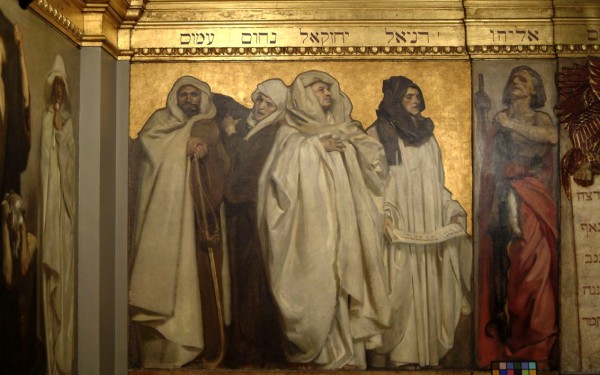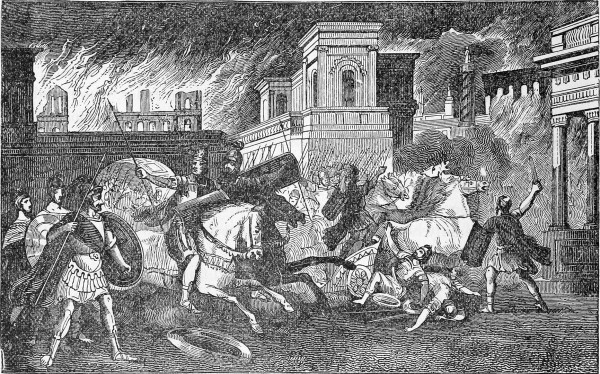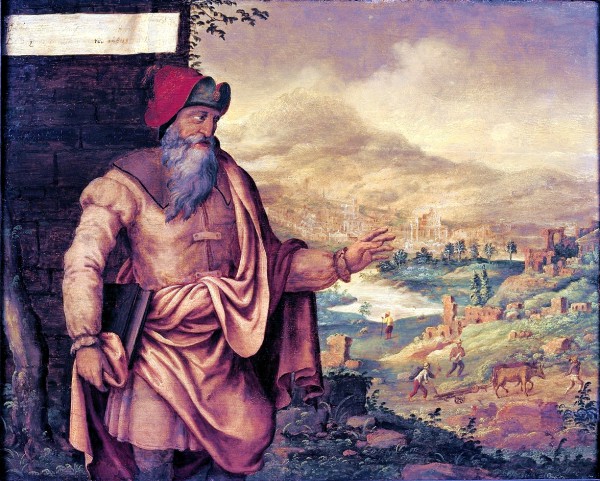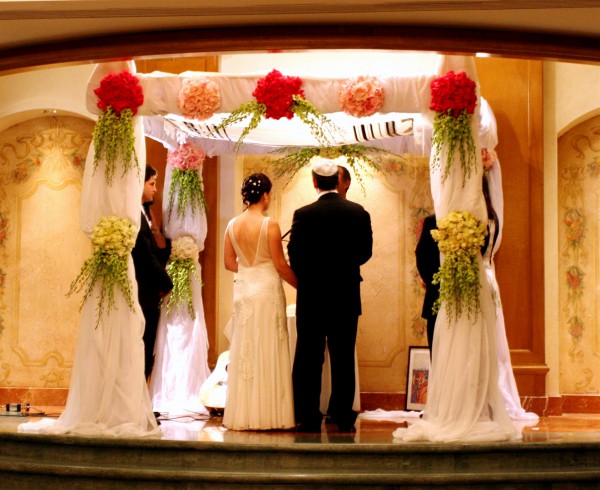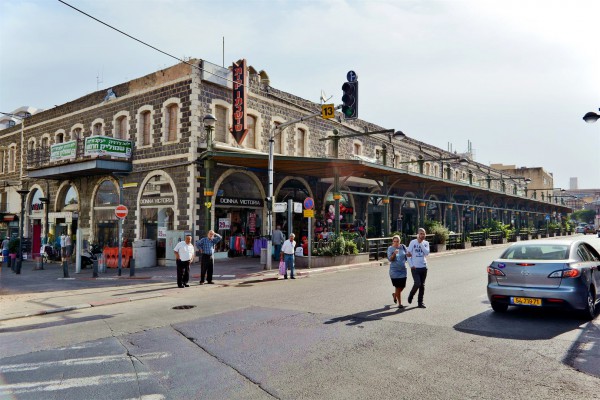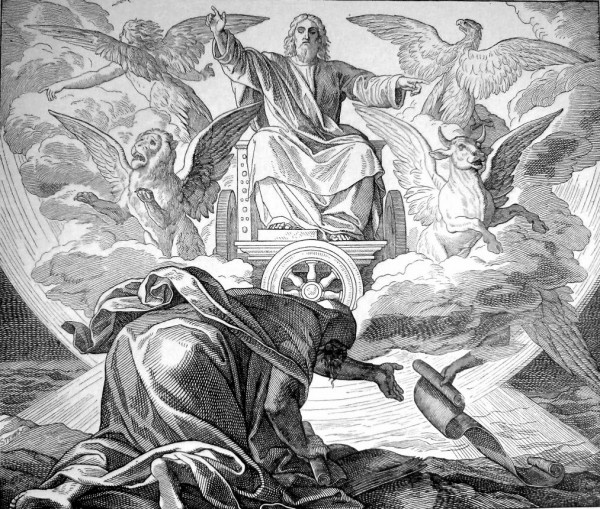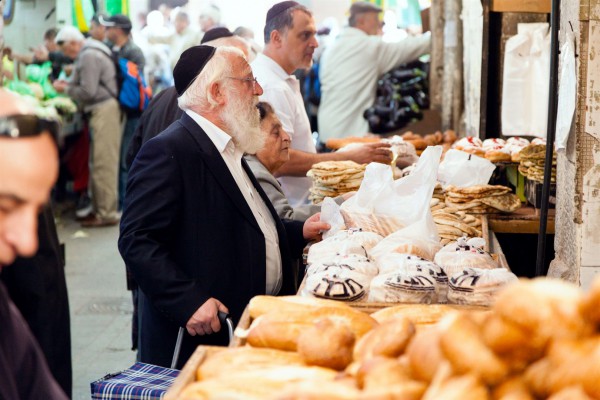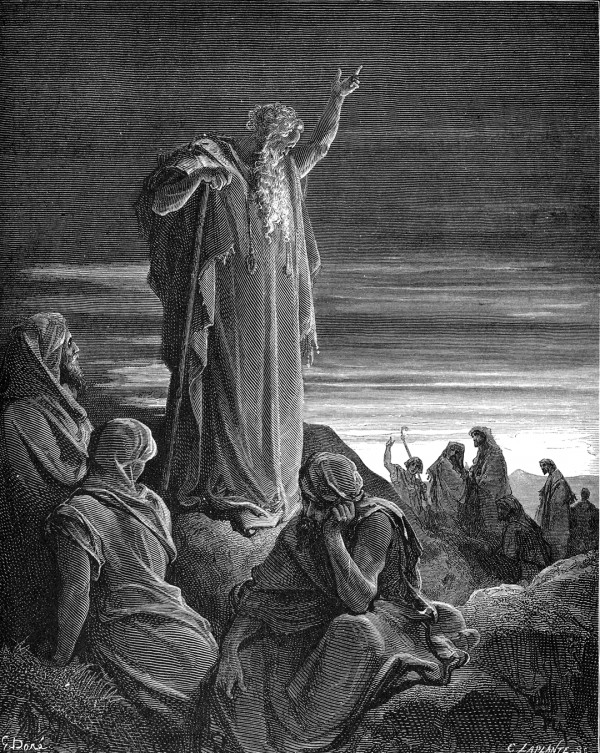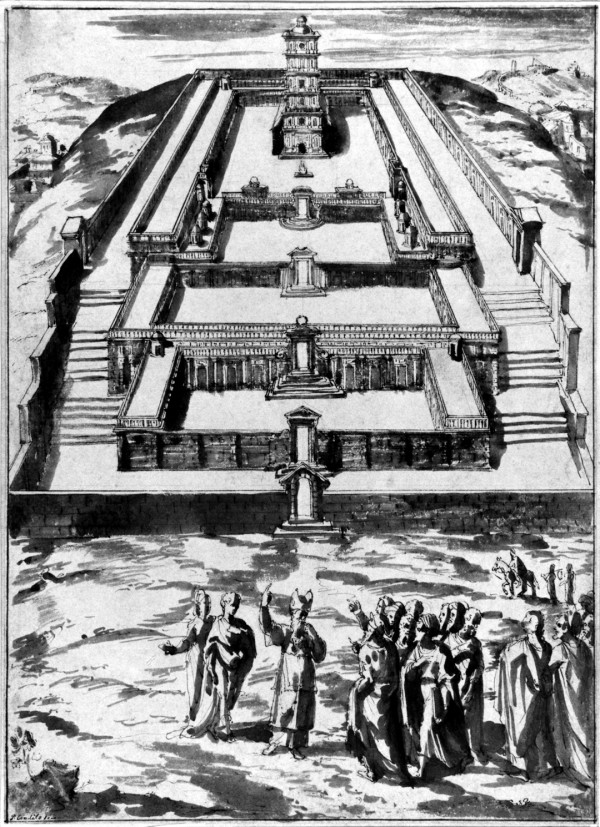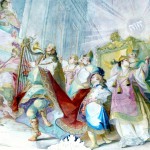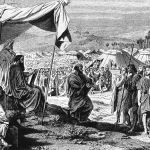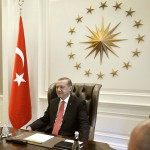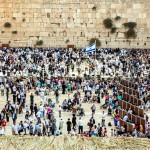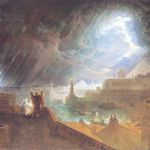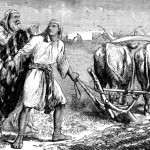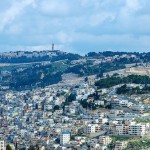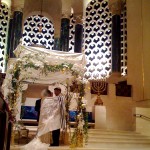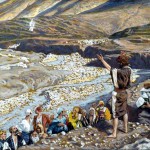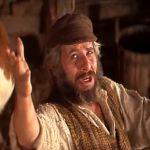When Babylon’s King Nebuchadnezzar carried off Israel’s King Jehoiachim and the leading families of Jerusalem into captivity in 597 BC, Ezekiel the priest was in that group. God called this priest to be a prophet at the age of 30, five years into this first Babylonian exile.
This captivity would be followed by a prophesied second captivity in 586 BC when Nebuchadnezzar fully destroyed Solomon’s Temple and besieged Jerusalem.
Daniel had already been taken captive into Babylon in about 605 BC during Nebuchadnezzar’s preliminary siege.
The prophet Jeremiah, who remained in Jerusalem during that time, tried to warn the Jewish People to repent of their idol worship and wickedness or face destruction and captivity. He later prophesied they would spend 70 years in exile beginning in the year 597 BC (Jeremiah 25:11).
Ezekiel also prophesied the coming destruction, but he focused his efforts on telling the Israelites why God was exiling them and how they could get right with the Lord again.
God’s Clear and Consistent Message
Ezekiel encountered God through extraordinary visions full of metaphor and symbology that have produced much speculation over the millennia, yet God also conveyed His message to the People of Israel through Ezekiel very clearly:
“Repent! Turn from your idols and renounce all your detestable practices!” (Ezekiel 14:6)
He even described in detail what these detestable practices were:
“You took your sons and your daughters, whom you had borne to me, and these you sacrificed to them to be devoured … as an offering by fire to them.” (16:20–21)
“In all your abominations and your whorings you did not remember the days of your youth, when you were naked and bare, wallowing in your blood and the Lord picked them up, cleaned them and clothed them.” (16:22)
“At the head of every street you built your lofty place and made your beauty an abomination, offering yourself to any passerby and multiplying your whoring.” (16:25)
God uses metaphor throughout chapter 16 to describe Israel’s wickedness as a whoring bride, but these sinful acts are not metaphors.
They are actual practices by a Chosen People whom God had set apart and given a role in sharing holiness with the neighboring nations, so they could come to know and worship the one true God as well.
Instead of affecting change through God’s righteousness, they were swept away by the sins of the nations and worshiped idols and sacrificed their own children in the fire.
The Lord Defends and Protects His Name
God’s wrath and judgment against His unfaithful bride is not the only theme in Ezekiel. Another recurring theme is her redemption back into His protection and bountiful provision in the land of Israel. This is not for her sake alone, but to make sure the nations do finally see that He is the one, true, holy and sovereign God of the universe.
“Therefore say to the Israelites, ‘This is what the Sovereign Lord says: It is not for your sake, people of Israel, that I am going to do these things, but for the sake of My holy name, which you have profaned among the nations where you have gone.
‘I will show the holiness of my great name, which has been profaned among the nations, the name you have profaned among them. Then the nations will know that I am the Lord, declares the Sovereign Lord, when I am proved holy through you before their eyes.
‘For I will take you out of the nations; I will gather you from all the countries and bring you back into your own land. Then you will live in the land I gave your ancestors; you will be My people, and I will be your God.’” (Ezekiel 36:22–24, 28)
Through supernatural signs and fulfilled prophecies, such as the regathering and restoration of the Jewish People back into their own land, supernatural protection, and victories against outnumbered armies, it seems the nations should realize that the God of Abraham, Isaac, and Jacob is real.
Amazingly, Ezekiel describes all of these future scenarios that we have seen unfold in our generation. Sadly, only a small percentage of the world’s population seems to realize that it is God who has done these great things.
Judgment and Personal Responsibility
While God’s plan of redemption for Israel as a nation is being played out in these last days, each person in every generation has a responsibility to repent and turn to the holy God of Israel or face personal judgment from Him.
God is so serious about making people aware of this that He held Ezekiel personally responsible for making sure the People understood the consequences of iniquity in their own lives.
For instance, if Ezekiel did not warn a righteous person about committing iniquity, God said that person “shall die for his sin, and his righteous deeds that he has done shall not be remembered, but his blood I will require at your hand. But if you warn the righteous person not to sin, and he does not sin, he shall surely live, because he took warning, and you will have delivered your soul.” (3:18–21)
The Good News and Hope for all mankind that Ezekiel and every prophet of God shared regarding sin, no matter how detestable, is the same:
“Repent! Turn away from all your offenses; then sin will not be your downfall. Rid yourselves of all the offenses you have committed, and get a new heart and a new spirit. Why will you die, people of Israel? For I take no pleasure in the death of anyone, declares the Sovereign LORD. Repent and live!” (18:30–32)
In chapter 18, the Lord tells the Israelites it doesn’t matter how holy their father or mother may be; when we stand before the Lord, we will be held accountable for what we did.
“I will judge each of you according to your own ways, declares the Sovereign LORD.” (18:30)
A Mystical Chariot and the Throne of God
Though it was probably not his prophetic intention at the time, Ezekiel made a significant contribution to Jewish mysticism with his detailed vision of a heavenly chariot under the throne of God (1:1–28).
This supernatural encounter with the heavenly realm began a new school of thought called merkabah (chariot mysticism). Those who have followed this school of mysticism since its earliest teachings in AD 100 seek to emulate Ezekiel’s experience and enter into the physical as well as emotional presence of God. (My Jewish Learning)
The idea of a heavenly chariot is not unique to Ezekiel. In Psalm 68:17 we read that “God’s chariots [rekhev] are myriads upon myriads, thousands upon thousands; the Lord is among them as in Sinai in holiness.”
Jewish traditions says that these chariots “descended with God (on Mount Sinai) 22,000 chariots, each one like the chariot that Ezekiel saw (Midrash Tanhuma Yitro [Buber] 14).” (My Jewish Learning)
Because of this traditional connection between Ezekiel’s vision of the chariot in chapter 1 and the giving of the Torah at Mount Sinai (which is celebrated on Shavuot/ Pentecost) Ezekiel 1:1–28 is read as the Haftarah (Prophetic) portion on this holy holiday.
The main works of Merkabah mysticism was composed in Israel from AD 200 to 700, and is a precursor to Kabbalah mysticism. The rabbis see traveling into the supernatural realm on a “spiritual chariot” to communicate directly with God so risky that the Talmud restricts study of these texts to only the most worthy sages. It also suggests that it should not be done alone.
Of course, Bibles For Israel does not condone such “travelling.” That is not the way to get to know God, and one does not need a “spiritual chariot” to meet with God. Neither do we require such mystical works written outside the Biblical texts to teach us how to approach the throne of God; and it most certainly can be done alone, even in our prayer closets (Matthew 6:6).
Further, God has sent His Divine Presence — the same Holy Spirit (Ruach HaKodesh) that filled Ezekiel and the prophets of the Tanakh (Old Testament) — to every Believer in Yeshua HaMashiach.
The veil that once separated the people from God’s Divine Presence in the Holy of Holies was torn down when Yeshua (Jesus) conquered sin and death.
“Behold, the curtain of the temple was torn in two, from top to bottom. And the earth shook, and the rocks were split.” (Matthew 27:51)
Yeshua’s victory now enables each of us to approach God. He is now our gate to Divine Revelation and personal communication with our Father in heaven, Adonai Himself. (John 10:7)
“You have received the Ruach of adoption as sons, by whom we cry, ‘Abba! Father!’ The Ruach Himself bears witness with our spirit that we are children of God, and if children, then heirs — heirs of God and fellow heirs with Mashiach…” (Romans 8:15–17)
A Tour of Hopelessness and Resurrection
The vision of the Valley of Dry Bones may be the best known prophecy of this Hebrew prophet.
In an allegorical sense, the vision of the dry bones can be seen as a kind of resurrection of our own lives in which, step by step, we learn to follow God’s guiding hand as we endeavor to right the wrongs that have accumulated in our lives.
As one writer wrote, taking such steps allows God to unearth the dry bones in our lives, to revive our hearts and to breathe new life into our souls. (Chabad)
But the Lord does tell us that these disconnected and utterly dried out bones that Ezekiel tours are the Jewish people (37:11), who had been living with seemingly no hope of redemption or a Promised Land of their own since the time of the Babylonian exile.
Can an utterly rebellious nation against God be redeemed? “Can these bones live?” asks God.
Here in the valley, God answers that question by clearly displaying His chesed (covenantal love) to His People. He promises:
“My people, I am going to open your graves and bring you up from them; I will bring you back to the land of Israel. … I will put my Spirit in you and you will live, and I will settle you in your own land. Then you will know that I the LORD have spoken, and I have done it, declares the LORD.” (Ezekiel 37:12–14)
This resurrection of life is to happen in stages: Bone align themselves together; tendons attach the bones to each other; flesh covers the bones; and finally, the breath of God (literally, His Ruach or Spirit) brings the bones to life as they stand on their feet and form a mighty army.
Where is Israel in this process of resurrection?
The Jewish People are certainly coming back to the Land of Israel and settling there as God promised through many prophets, including Ezekiel.
However, while we are seeing a physical fulfillment at this time, the spiritual restoration seems like it is yet to come since many are coming in unbelief of both God and their Mashiach, Yeshua.
Nevertheless, as the Prophet Joel prophesied, we are seeing the Ruach HaKodesh draw His people one by one in these last days.
We know this is true because the number of Jewish People who believe that Yeshua is their Messiah have grown from an estimated 6,000 worshipping in 80 congregations in 1998 to over 25,000 today in close to 200 congregations of various sizes.
Our staff at Bibles For Israel are especially privileged to see firsthand how the truth of prophetic Scriptures witness to the spirits of the Jewish People that Yeshua is their Savior and Lord, as well as Messiah.
False Prophets of Peace
Ezekiel unashamedly spoke the truth to Israel about their sin, their captivity and how the people could be redeemed from it.
At the same time, others who called themselves prophets led Israel to believe that there would be no destruction in Jerusalem, that its walls would not be breached nor its families taken into exile:
“Precisely because they have misled my people, saying, ‘Peace,’ when there is no peace, and because, when the people build a wall, these prophets smear it with whitewash, say to those who smear it with whitewash that it shall fall! There will be a deluge of rain, and you, O great hailstones, will fall, and a stormy wind break out.” (13:10–11)
Likewise, we see leaders of nations, the media, and even churches — the “prophets” of our day — mislead the world into a false impression that Israel is not really threatened in the Middle East, or they say that Israel is the real threat the world.
Israeli Prime Minister Benjamin Netanyahu publicly rebuked the world’s leaders for this deception in a previous speech at the United Nations General Assembly:
“Iran’s rulers promise to destroy my country, murder my people, and the response from this body — the response from nearly every one of the governments represented here has been absolutely nothing — utter silence —deafening silence.”
In Ezekiel’s day the Lord publicly proved that the promises of peace were false:
“I will break down the wall that you have smeared with whitewash, and bring it down to the ground, so that its foundation will be laid bare. When it falls, you shall perish in the midst of it, and you shall know that I am the LORD.”
Likewise, in the last days described in chapters 38–39, Ezekiel foresees that all false walls of protection and rumors of peace (spoken or unspoken) will ultimately crash down as well, and the world will know that the Lord has done it.
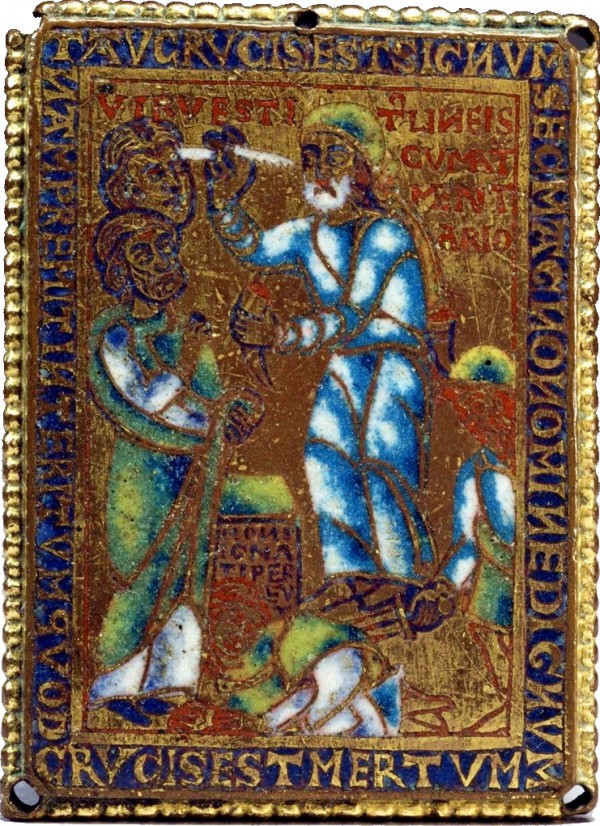
A Flemish enamel depicting Ezekiel 9, a vision in which those who grieved Israel’s sin had their foreheads marked in order to save them from Divine punishment for sins.
Tearing Down False Promises: The War of Gog and Magog
Near the end of Ezekiel’s visions, he writes about the establishment of the Messianic reign. He states that God Himself will put “hooks” into the jaws of a leader named Gog of a land called Magog (to the “far north” of Israel), persuading him to invade the Promised Land.
Gog will think that Israel is living in relative peace and abundance, making her an easy target. He will say, “I will go up against the land of unwalled villages. I will fall upon the quiet people who dwell securely, all of them dwelling without walls, and having no bars or gates, to seize spoil and carry off plunder … [among] the people who were gathered from the nations.” (38:11–12)
Ezekiel does not mention any foreign land coming to her aid. It seems that Israel stands alone as the invading soldiers cover the land like a cloud. Amid the silence, God speaks,
“I will rain down on [Gog], on his troops, and on the many peoples who are with him, flooding rain, great hailstones, fire, and brimstone. Thus I will magnify Myself and sanctify Myself, and I will be known in the eyes of many nations. Then they shall know that I am the Lord.” (38:22–23)

Israeli Prime Minister Benjamin Netanyahu visited Russia as it beefed up its military presence in Syria. (Israeli Embassy in Russia photo)
While respected minds differ, a good case can be made that Magog is in fact the modern nation of Russia.
While Russia has forged a mutually respectful relationship with Israel since it moved into Syria in September 2015, Russia has also forged significant alliances with Iran, Iraq, Egypt, Turkey and other regional nations.
In other words, Israel is still surrounded by prophesied enemies, not only those revealed in Ezekiel 38 but also Psalm 83. But now with Russia on Israel’s doorstep in Syria, the inclusion of a potential future threat from Russia has prophecy watchmen on their toes.
Ezekiel’s vision will be fulfilled some day; only time will tell if today’s scenario in the Middle East is a direct precursor to it.
We do know that after God brings the scattered people back to Israel, there will be a false peace treaty (Daniel 9:27) between Israel and the nations who want her destruction.
But God continues to reign on His throne in the heavens, and He promises to bring about the final, true peace treaty, the one that will never be broken:
“I will make a covenant of peace with them; it will be an everlasting covenant. I will establish them and increase their numbers, and I will put my sanctuary among them forever. My dwelling place will be with them; I will be their God, and they will be My people.” (37:26–27)
The Future Sanctuary
Ezekiel describes the Third Temple in detail throughout the final chapters 40 to 47.
That end-time structure is yet to be built, but with the number of end-time prophecies concerning a resurrected Israel currently in the process of being fulfilled, we can be certain that this time is close at hand.
Meanwhile, we await the construction of Ezekiel’s Temple, for which the Temple Institute and Temple Mount Faithful have already prepared blueprints, construction materials, utensils, adornment, furniture and priests who will reestablish ritual sacrifices.
This Temple is associated with the coming Messianic Age. Therefore, let us look forward to Yeshua’s soon return with ever increasing anticipation and expectation.




